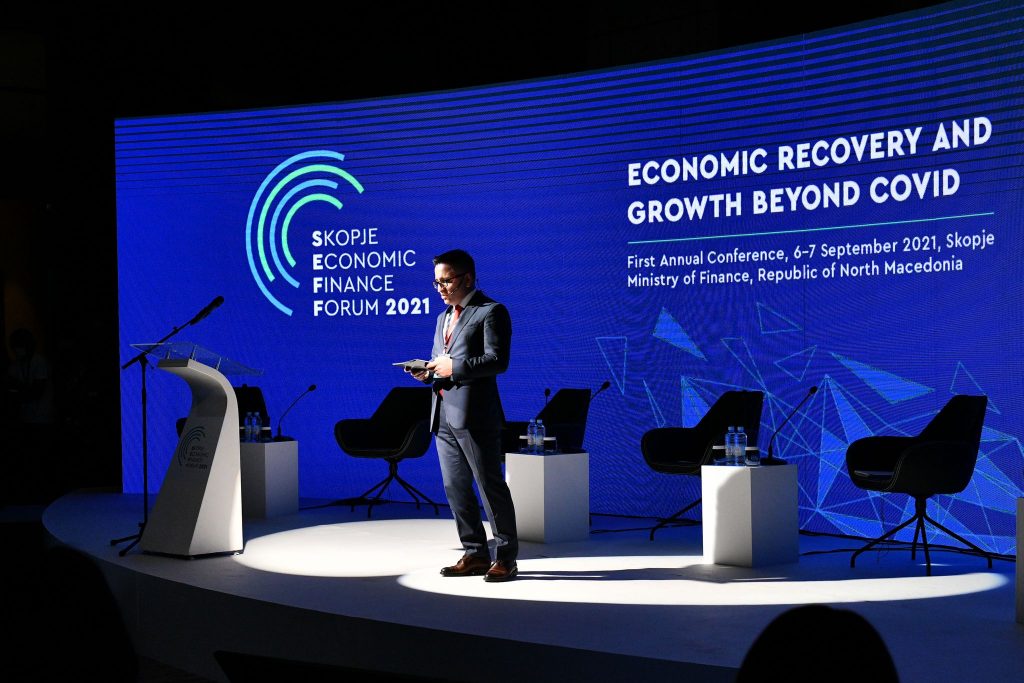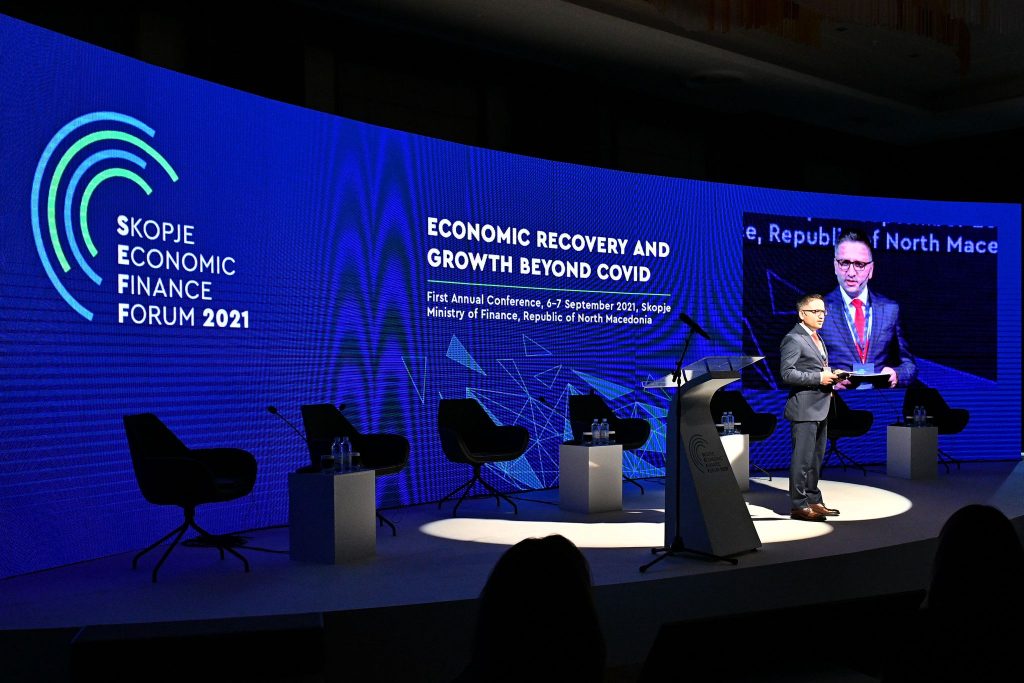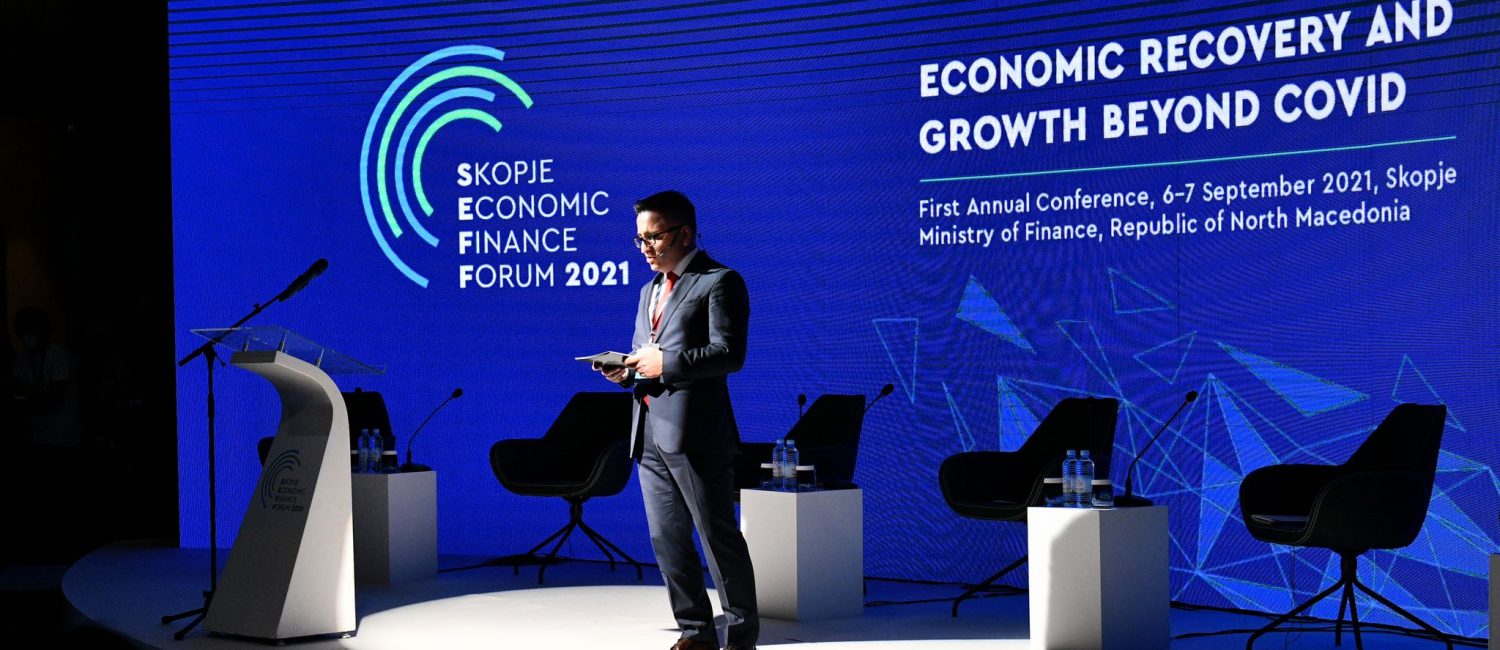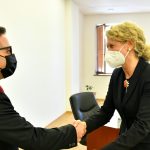18th September 2021, Skopje – At the beginning of September, Ministry of Finance organized the First Annual Conference – Economic Recovery and Growth Beyond COVID – within the Skopje Economic Finance Forum 2021. It was of utmost importance to hear, in one place, about the experience and the views of high-level government officials from the country and the region, as well as those of IFIs representatives, on a topic which affects us all and we should all together come out of the crisis as winners. Proposals made and messages sent at the Conference are of particular importance when designing future policies and measures aimed at achieving better results in attaining our goals – economic recovery and inclusive, accelerated and green growth.

Global and regional prospects of post-pandemic recovery and growth, good governance and citizen participation, adequate, timely and well-targeted support for social inclusion, digitalization, green economy, as well as human capital formation, were part of the discussions at the First Annual Conference. The Conference is part of the efforts of the Ministry to raise transparency and increase inclusiveness. Our goal is for the Conference to grow into tradition, acknowledged in the region and the EU.
My message was that we were gathered to say that: We are not going to be defeated by COVID. We are part of a global alliance to fight the Coronavirus, thus, we will talk not only about the recovery itself, but much more than that, discussing growth and development, better and accelerated growth, as well as smart and green development.
We responded to the global pandemic, which also hugely affected our country, with measures to fight COVID-19, steered towards protecting the lives and reviving the economy. Therefore, last year, we allocated fiscal stimulus accounting for 11% of GDP through various measures addressing the health sector, the vulnerable categories, protecting jobs, helping the businesses to survive the crisis. We thus managed to mitigate the GDP decline by 4.2 p.p., otherwise it would have been 8.7%. According to the official reports of the State Statistical Office, GDP grew by 13.1% in Q2 compared to the same period last year, with growth reaching above zero in the positive zone for the first time after four subsequent quarters with negative GDP growth rate. From methodological standpoint of view, economic crisis is officially over.
We have projected growth of 4.1% for this year and an average annual growth of 5.4% in the next five years. Following the positive economic trends this year, including the third quarter, we are probably going to revise our forecast, with a higher GDP growth being estimated for 2021. To make sure that this will not remain just a wish, we have prepared a Recovery and Growth Acceleration Financing Plan, while maintaining fiscal stability by mobilizing capital from the private sector, in addition to the funds allocated from the Budget. At the same time, we are focused on fiscal consolidation in the medium term by reducing both the budget deficit and the public debt and bringing them within the fiscal rules of 3% and 60% as a share of GDP, respectively. If truth be told, due to the depth of the pandemic crisis, the European Union activated the general escape clause of fiscal rules and introduced temporary suspension of the Maastricht Criteria.
Prominent international institutions attending the Conference sent messages of support for the policies we implement. Macroeconomic environment is changing. We see political stability, regional integration and better implementing of the rule of law, which will provide for the investors to discover and rediscover the country. Representatives of EBRD, EIB, WB, … extended support for the infrastructure projects and EU integration, new investments in the energy sector, green economy and digitalization.
All valuable conclusions shared during the two-day Conference through six panel discussions are a significant input in designing the policies for the next year and in the longer run, with some of them summarized below.
The pandemic as a common challenge – Recovery is expected in 2022
Globally, the recovery differs across countries and across sectors, depending on each sector’s condition, related to the measures aimed at coping with the crisis, in particular those for fiscal support, as well as depending on the growth in the countries, their development model and the fiscal space for incentives.
The recovery is expected to be achieved in 2022, however, the global challenges still stand, such as climate changes, social inequality, inequality in distribution of vaccines and other security-related challenges. Moreover, challenges we face which are important and need to be addressed are sustainable growth, source of growth, factors of growth, as well as model of growth. Set of documents has been prepared to that end – Recovery and Growth Acceleration Financing Plan, Economic Reform Program, Fiscal Strategy, Public Debt Management Strategy, Tax System Reform Strategy, Action Plan for Reduction of Informal Economy, as well as fiscal decentralization reform to support the local development.
Macroeconomic policies and public finances in post-pandemic times, focusing on growth in the medium term and fiscal consolidation
Amid pandemic, what is common for all countries is to focus on growth in the medium term and fiscal consolidation at the same time.
The plans have different titles, but, in essence, they all have many goals in common. They are: strengthening the capacity of the healthcare systems and increasing the vaccination rates, as the higher the vaccination rates the higher the economy recovery. Structural and fiscal reforms to build credible fiscal policy that will provide for fiscal consolidation, consolidation of the public debt, as well as fiscal buffers for future challenges and crises. It is necessary to increase capital investments in the health system, infrastructure and green growth, accompanied with control mechanism that will increase the efficiency and the effectiveness of the investment projects, as well as the investments in human capital, new financing instruments as regards growth, structural reforms along with good governance, building political consensus on this agenda and continuing the regional cooperation.
“Good Governance and Social Cohesion” – we need “temporary” or “transitional” good governance concept and new approach to social cohesion
The pandemic has foisted new way of governing the society set by the health-related priorities. Most of the participants have agreed that we need “temporary” or “transitional” good governance concept and new approach to a social cohesion, as well as greater role of the modern technologies.
Many other important issues on good governance and social cohesion are related to corruption and rule of law, efficient judiciary system, high level of coordination of the society to face the pandemic crisis, vaccination so as to prevent the blow on the economic trends and further increase of poverty, in parallel with investing in people.
The core of good governance and social cohesion is the need for a sustainable recovery, including green deal and digital agenda, and taking care for a further delivering of public services, employment and justice.

Public and Private Investments and Competitiveness – Support and partnership for growth and development
There are distinctions as regards the challenges the businesses face, depending on their size. The need for continued government support to the businesses directly hit by the pandemic still exists, all to the end of preserving people’s lives, jobs and their wellbeing.
Businesses still rely on both financial and non-financial support, including fight against corruption, rule of law and reduction of grey economy, in order to create good business climate. On the other hand, businesses, which have already made plans for future investment in order to increase their competiveness, expect low taxes, better transparency, efficient public administration, and timely fulfillment of government obligations towards them.
The current crisis is an opportunity for structural changes towards greener economy and supporting investments in renewable energy sources, such as photovoltaic, windmills.
Smart and Green Economy – Driving force of recovery
Post-pandemic recovery cannot be based on current model, continuing business as usual. Recovery will mainly depend on three pillars – digital economy, green economy and sharing prosperity to everybody, requiring huge investments by the government, the local authorities, the international financial institutions and the private sector.
To than end, European Investment Bank (EIB) will unlock EUR 1.7 billion of climate action and environmental sustainable investment, EC adopted Investment Plan for the Western Balkans for the period 2021 – 2027, which includes investment package mobilizing up to EUR 9 billion for climate action, decarbonisation, circular economy, protection and restoring the natural wealth, fighting air, water and soil pollution, as well as sustainable food systems and rural areas.
Investments in human capital provide for accelerated economic growth and better quality of life
Investments in human capital provide for better skills and knowledge, contribute to improved productivity and accelerated economic growth, and lessen the poverty and inequality.
Human capital development takes a lot of time, no immediate results can be seen, it requires bold reforms and decisions that are not easy to make, as well as continuity. One of the crucial elements is the Human Development Strategy, intended to be long-term oriented, based on facts and arguments, realistic and measurable.
Platform for ideas, debate and growth and development policies
The Conference has given us guidance, answers to important issues, sending significant messages to be the basis for designing future policies. After the Conference, what is of essence is to be focused not only on the policies to provide strong impetus for recovery and growth acceleration, but also on the resilience of our economy to the new challenges. We remain open through the Skopje Economic Finance Forum, which we hope will grow into a platform through which the policy creators, the political representatives, the international development partners, the civil society, the academicians, the experts and all stakeholders will exchange opinions, initiate ideas and give initiatives for key and important topics national and regional relevance in the field of economy and finances.
Famir Besimi, Minister of Finance
















